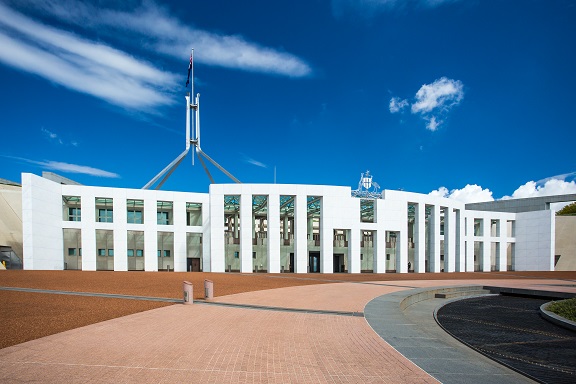
by Ashley Gardiner | Jun 20, 2024 | Opinion Editorial
Published in the Herald Sun, 20 June 2024
By Andrew McKellar
The recent threats from CFMEU boss John Setka against the AFL are a stark reminder of why most Australians shun the union movement. Amid this aggressive conduct, it’s no surprise that nine out of 10 Australian private sector workers choose to overlook unions.
As calls for the abolition of junior rates show, unions are disconnected from the needs of a modern workforce, particularly younger workers starting out.
Instead of focusing on delivering for their members, some union bosses are focused on asserting power and settling old scores.
Australia is facing a productivity crisis, yet it is rare to hear any union leader discussing how the country can work smarter for the benefit of all.
Unions are the most rigid organisations in the country, resisting any meaningful change, except to push for unrealistic demands like a four-day work week.
The government is now belatedly proposing a change to allow the manufacturing division to separate from the CFMEU.
But it’s not addressing the real problem. Shutting down the Australian Building and Construction Commission was a huge mistake – it was the sole organisation that could keep the rogue CFMEU in check.
Setka was so emboldened that he thought it was perfectly fine to try to bully the AFL into sacking its head of umpires, who previously worked for the ABCC.
Setka might think he is special or unique. He is not. He is the latest in a long-running tradition in the construction sector.
Employers feel that many of the government’s industrial relations law changes have encouraged these kinds of union antics.
The so-called closing loopholes legislation is designed to aid union recruiting. Instead of making it easier to employ more people, it’s not so much about closing loopholes than closing a vice on small businesses.
Rather than making it easier for young people to enter the workforce or reducing red tape, unions were given more power to enter workplaces.
Australia’s leadership needs to stand up to outrageous behaviour by unions, urgently address our sagging productivity and make it easier to employ people.
The tedious antics of rogue union bosses might be absurd and slightly bemusing, but serious implications exist. Left unchecked, we all will pay a higher price.
Andrew McKellar is the chief executive officer of the Australian Chamber of Commerce and Industry

by Ashley Gardiner | Oct 17, 2023 | Opinion Editorial
Andrew McKellar is the chief executive officer of the Australian Chamber of Commerce and Industry
When Prime Minister Anthony Albanese travels to Washington DC next week for a high-level state visit, he does so amid turbulent geopolitical and commercial currents.
The turbulence is being felt by Australia’s business sector as well.
In this year’s ACCI National Trade Survey, more Australian businesses indicated that they are trading with the United States than with any other trade partner including, for the first time, China.
This shift to the United States is a reflection of the strong and stable trade and investment relationship between our two countries. It remains to be seen whether this is a new trend or an exceptional case following our time in China’s diplomatic and commercial freezer.
China will remain an important trade partner for Australian businesses. The fundamentals of our respective economies guarantee this. But there are lessons to learn from the experiences of the recent past.
Australian trading businesses have learnt – some the hard way – that there is a vulnerability in being too reliant on a single trade or supply chain partner. As with any portfolio, overexposure bears a risk.
We do not have the option not to trade. But we do have options in how we confront these challenges.
It is encouraging that businesses, not only in the CBDs of our capital cities, do precisely that.
This year’s survey shows Australian businesses understand these issues not as abstract concepts but as day-by-day, bread-and-butter commercial realities.
Most Australian trading businesses (71 per cent) considered the need to diversify markets a concern, and almost as many said the same of geopolitical tensions (60 per cent).
Faced with international market risks, businesses report increasing marketing into new or existing markets, finding domestic markets, or developing new products.
Governments have a significant role to play in encouraging this diversification, but it is ultimately up to businesses to take the practical steps to achieve that outcome.
Indeed, the findings in the survey suggests that Australian trading companies are highly active in seeking new customers and markets to help manage this market risk.
However, when it comes to managing the risks of supply chain disruptions, the options appear to be more limited, with a majority of companies simply opting to pay more for the services that they require.
It’s therefore not surprising that in this year’s survey yet again, international competitiveness remains the leading concern of Australian trade businesses.
That said, there is a real question about the extent to which Australian businesses are practically taking advantage of the network of trade agreements that they presently have access to.
A consistent finding across this and five earlier trade surveys is that trade agreements are not well understood by many businesses. While agreements such as the China-Australia free trade agreement are better understood, familiarity with newer bilateral agreements is more mixed.
Understanding of the usefulness of large multilateral agreements – such as the Regional Comprehensive Economic Partnership and the Comprehensive and Progressive Agreement on Trans-Pacific Partnership – are also lagging behind. Understanding and accessing the benefits of these existing agreements is clearly an area with upside potential.
One of the greatest pain points identified by businesses in our survey is that they do not have enough information on how to trade in international markets.
Both business and government need to work together to drive greater utilisation of these existing pacts to achieve meaningful economic outcomes that strengthen Australia’s economy and create jobs. Australia’s business groups, industry associations, and the government must work together to drive this engagement.
Skills shortages represents another barrier. The persistent shortage of skilled labour highlighted in a report by Jobs and Skills Australia earlier this month is one place where the focus should be renewed. This is certainly a strong area of engagement between business and government.
Beyond our trade agreements, it is clear to our chamber network in every state and territory that Australian businesses are finding partnerships worldwide, trading with over 160 countries this year alone.
Business must show proactivity in engaging and deepening trade ties with these markets. It will contribute to our efforts towards diversification.
Finally, securing our supply chains is of crucial importance. 90 per cent of respondents identified that they suffer from shipping and logistics challenges, with customs and border crossing costs the second highest concern.
In light of this, ensuring that the government’s $414m investment in the Simplified Trade System reforms delivers a tangible dividend to trade businesses is another. We must keep pace with international developments if we are to remain competitive, including learning from the experiences of our partners in the International Chamber of Commerce.
Making our way in this more complex trade environment will require us to learn the lessons of our recent past and commit to doing what is necessary to meet these new challenges.
It will not be easy, but it is nevertheless vital.
Published in The Australian on October 17, 2023

by Ashley Gardiner | Oct 2, 2023 | Opinion Editorial
Andrew McKellar is the chief executive officer of the Australian Chamber of Commerce and Industry
Last week the Albanese government released its 251-page White Paper on Employment after more than a year in development.
It had a number of useful initiatives, including a $41m boost in funding for TAFE centres of excellence, a promise to develop a national skills passport, and a permanent extension of the increased pension work bonus.
Notably, for a major paper on employment policy extolling the very worthwhile goals of a more inclusive, flexible, and productive labour market there was barely a mention of the government’s current industrial relations agenda.
The business community noticed the absence of industrial relations discussion because it is the elephant in the room.
The government’s proposed industrial relations changes are so large and damaging to the economy that they dwarf the positive measures announced in the White Paper.
The workplace changes proposed, such as making it harder to hire casuals, reducing flexibility in the gig economy, reducing the ability to use labour hire, asserting control of supply chains, and pushing right-of-entry of unionists into workplaces, will each be significant steps backwards in flexibility and productivity.
The changes run in the opposite direction to the liberalisation of the labour market undertaken by former Prime Ministers Bob Hawke and Paul Keating, and counter to the needs of the modern Australian economy.
A key part of the very strong performance of the Australian economy over recent decades has been our flexible labour market, and it would be an act of deep folly to abandon that advantage in the pursuit of an utterly misleading and economically illiterate narrative about higher nominal (not real) wages and fictitious job “security”.
The proposed industrial relations changes appear to have no policy basis other than the impatience of the trade union movement to bring about a more government-regulated employment and wages system.
The notion that wages should be based on effort, or experience, or productivity, is being overturned by a push for government-enforced “same pay”. The idea that the best place to decide workplace arrangements is at the individual enterprise is being replaced by moves to shift these decisions to the Fair Work Commission.
The 800 pages of draft legislation currently before the parliament looks like a fantasy product of industrial relations lawyers who have no understanding of the business world or the broader economy.
The sheer complexity of the bill will be stressful, costly, and time-consuming for businesses already struggling to comply with a notoriously difficult system.
The time has come for Anthony Albanese and Jim Chalmers to wrest back control of the policy agenda to a more coherent and ambitious vision for economic prosperity.
Policymakers in charge can no longer ignore the productivity-harming effects of the industrial relations changes and pretend that they are a separate issue to economic management.
Workplace arrangements affect and shape every single employer and every single employee in Australia. They profoundly influence how well businesses can function, manage, adapt, and compete. They are critical to our economic prosperity.
When industrial lawmakers and lawyers propose to clag up the system with rigidity and red tape it’s time for economic policymakers to say “no” – you are not going to drag down the economy for the benefit of sectional interests.
The context for the industrial relations changes is relevant to note: productivity growth in Australia over the past decade has been the worst in sixty years, with current levels going backwards. The Productivity Commission has warned that this means lower living standards in years to come.
The Regulatory Impact Statement accompanying the current draft legislation analyses a variety of aspects such as complexity (it expects compliance costs for business to go up considerably) and broader labour costs to business (an additional $9 billion over ten years), but it does not address the question of productivity or economic impacts.
One way for Cabinet to avert a possible productivity calamity affecting all portfolios would be to pause the Bill and commission a thorough assessment of the economic impacts of the draft legislation by the Productivity Commission.
Such a step would allow Cabinet to satisfy itself that the legislation was being fully examined for possible economic effects and unintended consequences before being imposed on the Australian business community.
The government is pursuing a range of creditable policy initiatives in different areas, but it would be regrettable if these achievements were rendered meaningless because of a series of blunders on industrial relations policy.
Published in The Australian on October 2, 2023

by Ashley Gardiner | Sep 21, 2023 | Opinion Editorial
Andrew McKellar is chief executive officer of the Australian Chamber of Commerce and Industry
Bran Black is chief executive officer of the Business Council of Australia
Luke Achterstraat is chief executive officer of Council of Small Business Organisations Australia
Innes Willox is chief executive officer of Ai Group
Tania Constable is chief executive officer of the Minerals Council of Australia
As anyone who employs another Australian knows only too well, our workplace relations system is incredibly complex. The Fair Work Act has 800 sections, there are 121 modern awards and more than 100,000 separate wage rates and allowances for employers and employees to navigate.
Into this confounding space – and in the middle of a cost-of-living crisis – the federal government has dropped another near-300 pages of legislation that, amazingly, requires an extra 500 pages to try to explain it.
Our workplace relations experts are still poring over the Fair Work Legislation Amendment (Closing Loopholes) bill, identifying the intended and unintended consequences, the inconsistencies and the layer upon layer of additional complexity.
This includes new definitions for “employees”, “employers” and “casuals” and 13 different start dates for different measures.
Good luck to anyone trying to decipher what it really means for their business or their job.
The reality is – and this is the important point – this bill still represents the most radical restructuring of our workplace system in decades. Despite the government’s repeated attempts to play down its impact, the bill will impact every business – big and small – that employs casuals, uses labour hire or engages contractors and reaches across the entire gig economy.
Furthermore, buried in the bill, and curiously absent from the public consultation process, are significant new powers and protections for union officials and their shop stewards.
What is also clear is that the government was planning a repeat performance of its multi-employer bargaining strategy last year, when it pushed through sweeping union-friendly reforms in a similarly complex omnibus bill in just five weeks.
Thankfully, this time around, the Coalition and crossbench, including Senators David Pocock and Jacqui Lambie, have united to delay the bill until at least February so it can be the subject of proper parliamentary scrutiny through the inquiry process.
They have also called on the government to bring forward elements dealing with issues such as silicosis, domestic violence, and PTSD for first responders, so they can be dealt with urgently. This is a responsible and commonsense approach welcomed by business.
But after that, there are a number of reasons why government should go back to the drawing board on the entire bill.
First, of significant concern are measures that redefine casual work in a way inconsistent with the simple and easy to apply approach that was only recently reaffirmed in the High Court. Instead the government is proposing a new three-page and multi-step test that will be complex, confusing and costly for industry to apply in practice.
The bill also introduces an avenue for casuals to convert to permanent employment after just six months in a role. Importantly, employers will have no grounds for reasonably refusing a request and will face heavy financial penalties if they get it wrong.
These changes will likely force employers to offer fewer opportunities for casual work or provide casual employees with less regular work. This is a foreseeable outcome because employers that don’t make these changes will be subject to heavy financial penalties.
In short, this is a bad outcome for employees who look to casual jobs for flexibility, regularity and additional upfront income. Ironically, it will make their work more insecure.
Second, among the many unresolved issues relating to labour hire is confusion over who will be captured by the new rules. It is unclear how widely these changes will apply to independent contractors, with the whole concept of “employer” and “employee” being rewritten elsewhere in the bill.
Third, regarding gig work, with its new concept of “employee-like” work, the government is attempting to retrofit an outdated wage-setting model on the most innovative section of the economy. Again, it is unclear who will be covered but, contrary to the government’s claims, we now know that tradies working through Airtasker are likely to be captured.
Fourth, and further demonstrating the breadth of the bill, the road transport industry is facing another attempt to enable an industrial tribunal to set new prescriptive rules around terms and conditions for truck drivers. The last time an initiative like this was implemented the livelihood of a vast number of owner-drivers looked set to be destroyed as they were priced out of work and the government abandoned the system.
Fifth, any suggestion that the bill will not impact small business doesn’t stand up to scrutiny, especially given the impact of major definitional changes to casuals and independent contractors.
If anything, small businesses will be the most impacted as they spend hard-earned money grappling with complex changes during a cost-of-living crisis without the aid of a dedicated HR department or large legal budgets. The so-called small business exemptions are better described as window dressing.
Finally, as if the changes didn’t go far enough, the bill will also make it easier for union representatives to enter small business premises, from farms to shops, to childcare centres and small offices, without notice.
The combined impact of these 800 pages risks delivering the opposite of what the country needs by stifling jobs, productivity and wages growth and adding to confusion, complexity and cost.
Published in the The Australian, September 21, 2023

by Ashley Gardiner | Sep 21, 2023 | Opinion Editorial
Heidi Cooper is the chief executive officer of Business Chamber Queensland
This month we saw significant industrial relations reforms introduced to parliament, which have the potential to impact how Queensland businesses engage and manage their workforces.
We’re concerned these legislative reforms have unintended consequences which are likely to have a compounding impact on an already stretched and stressed business community.
It is essential that workplace conditions are carefully considered and all employees work in the best possible conditions. Our research shows 70 per cent of businesses say inefficient regulation is limiting their growth while the median business cost of complying with inefficient government regulation, or red tape, is $50,000 a year.
Combine that with record high labour and business operating costs, weak forward economic confidence, the ongoing skilled labour shortages and macroeconomic challenges, these IR reforms will add another layer of complexity to running a business.
As a state chamber of commerce, we have been working closely with the Australian chamber and other state and territory chambers to ensure employers are front and centre of decision making around these IR reforms.
We’ve already seen some important changes to the original potential impact through our advocacy, such as small business exemptions on some of the reforms but there is still work to do.
So what happens now? The Senate Education and Employment Legislation Committee report on the Bill is due on 1 February 2024, which means Senate debate of the Bill will happen after that time.
We’re working to encourage the Federal Government to reconsider these reforms in the context of their potential compounding impact on employers and the wider economy.
At the same time, we’re working closely with the state’s business and employer community to help them understand these proposed reforms and what they mean for them and their workforces.
It is essential that Queensland businesses needs are at the forefront of any legislative changes which impact the way they operate day-to-day. It is critical Queensland businesses are front and centre of these reforms. For more visit businesschamberqld.com.au
Published in the Courier Mail, September 21, 2023

by Ashley Gardiner | Aug 31, 2023 | Opinion Editorial
David Alexander is chief of policy and advocacy at the Australian Chamber of Commerce and Industry
You may have noticed a number of high-profile employers admitting they have underpaid their employees.
The Reserve Bank, the ABC, various large corporates, law firm Maurice Blackburn and, last week, the Department of Employment and Workplace Relations confessed to staff underpayments. We need to ask the question: what is going on here?
There has been no great outbreak of criminal ideation among this generation of employers. The fact is that none of these employers would consider for a moment deliberately underpaying their staff.
What is actually going on is an entirely separate phenomenon of increasing complexity leading to execution breakdown.
The Reserve Bank deputy governor Michele Bullock hit the nail on the head when she said the RBA underpayments were the “result of the complicated nature of our industrial arrangements and their interpretation”.
The fact is that our industrial relations laws have become hideously complex to the point where even highly skilled experts struggle to manage their systems.
If the Reserve Bank has difficulty complying with the system, you can only imagine how stressful the task is for small and medium-sized businesses. The Australian workplace relations system is recognised as one of the most complex in the world. The Fair Work Act 2009 contains over 1200 pages of legislation.
It should be no surprise that a majority of businesses have described Australia’s workplace relations regulations as either “very complex” or “extremely complex,” according to surveys conducted by the Australian Chamber of Commerce and Industry.
Last year the government introduced another layer of complexity to the system through 288 pages of new legislation introducing multi-employer bargaining and other workplace law changes.
The government’s cost estimates for this extra compliance burden on Australian business were revealed at the time – small businesses $14,638; medium businesses $75,148; and large businesses $94,311.
For the businesses with more than 20 employees ultimately impacted, the costs in finance, time and stress are significant.
The obvious answer to this problem is to address the root cause by reducing the complexity.
Unfortunately the government is doing the opposite – it is soon to introduce yet another major round of complex legislation involving labour hire, casual workers and contractors.
Here is what we can predict with ease: the government turning up the dial again on complexity will result in yet more wage underpayments across Australia.
This government action is obviously not a deliberate form of taking money from workers but it could constitute a form of reckless indifference to that outcome.
The irony is that while the problem of complexity-induced underpayments is one that results from ministerial decisions, the focus of the government right now is on introducing new criminal penalties on employers for underpayment.
This is a classic example of focusing on the symptoms rather than the cause. The Australian Chamber of Commerce and Industry’s position on this matter is clear: the first priority must be for policymakers to recognise their own role in causing underpayment issues through adding complexity.
Fix that problem and much of the air goes out of the underpayment balloon.
Making wage theft, like any robbery, a criminal offence is perfectly reasonable but inadvertent underpayments should not be treated as deliberate behaviour.
As legislators consider the next raft of IR changes, they need to consider that adding complexity to the system is contributing to workers being underpaid.
Admitting the problem is half-way to solving it.
Published in The Daily Telegraph on August 31, 2023







